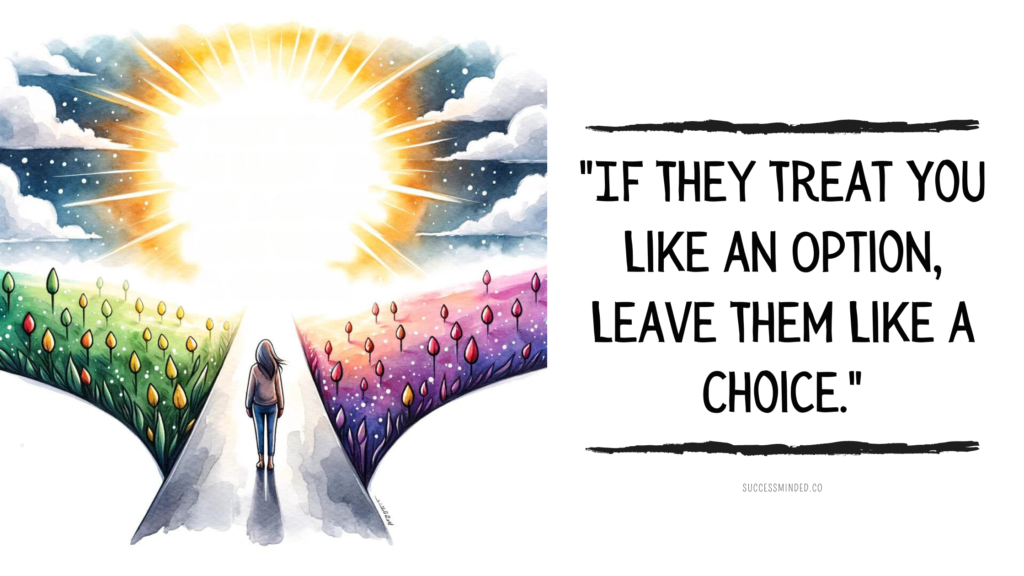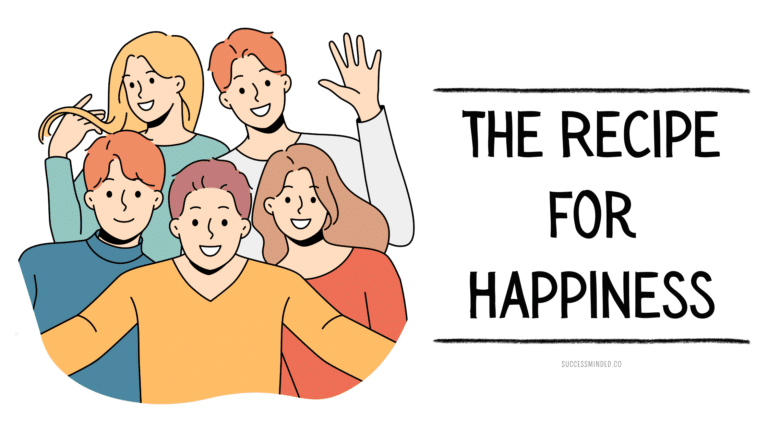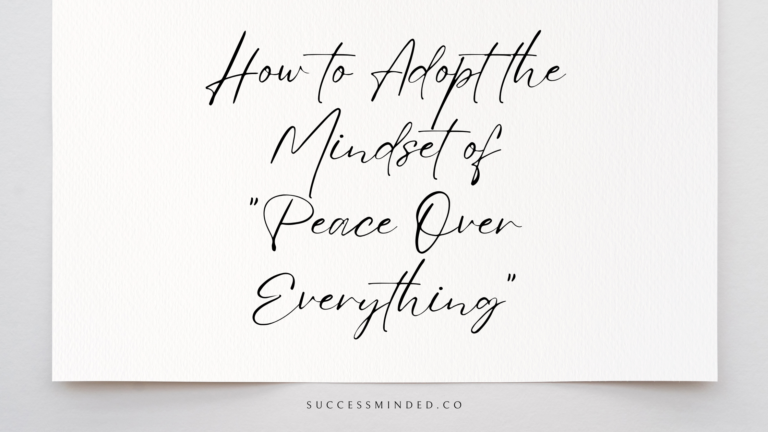In a world where relationships shape much of our happiness and success, it’s crucial to understand the value we bring to the table—and the value others place on us in return. The quote,
“If they treat you like an option, leave them like a choice.”
Serves as a powerful reminder of this dynamic. It speaks to the heart of self-respect and the importance of recognizing how we’re treated in personal and professional relationships.
This article delves into the essence of knowing your worth and making empowered decisions that reflect that worth. It’s about not just reacting to how people treat us but actively choosing how we respond and what we are willing to accept.

Meaning of the Quote, “If They Treat You Like an Option, Leave Them Like a Choice.”
At first glance, this quote might seem like advice for a narrow situation, but its implications are far-reaching. It suggests that if someone treats you as an option—an afterthought or a backup plan—it’s a signal to reassess your position in that relationship. This is not about encouraging a quick exit at the first sign of trouble but about recognizing a pattern of behavior that diminishes your value.
The quote underscores the importance of self-worth. Knowing your worth means understanding that you deserve to be treated with respect, kindness, and priority. It’s realizing that your time, feelings, and contributions are valuable and should be treated as such. When we talk about not being treated as an option, we’re speaking to the heart of what it means to be valued and respected.
Moreover, the quote champions the idea of empowerment through choice. It reminds us that we are not helpless in how we’re treated; we have the power to make decisions that honor our worth. Leaving a situation where you’re seen as an option is a declaration that you understand your value and are willing to take steps to protect it. It’s about making a conscious choice to seek out environments and relationships where you are appreciated and respected.
In essence, the quote is a call to action. It encourages us to reflect on our relationships and professional interactions, to recognize our worth, and to make choices that affirm that worth. It’s about not passively accepting poor treatment but actively choosing a path that reflects the respect and value we deserve.
Understanding Self-Worth
Self-worth is the value we assign to ourselves. It’s how much we appreciate and like ourselves, regardless of how others view us. This concept is vital because it affects every choice we make—from the friends we choose to the jobs we accept.
When we have high self-worth, we believe in our value and expect others to treat us with respect. It means knowing that you deserve happiness, respect, and love just as much as anyone else.
Self-worth influences the quality of relationships we allow into our lives. If we value ourselves, we’re less likely to tolerate being treated poorly. We understand that being someone’s option, rather than their priority, doesn’t align with our worth. On the other hand, low self-esteem might lead us to accept less than we deserve, thinking that’s all we’re worth.
Therefore, recognizing and building our self-worth is the first step toward not being treated as an option.
Signs You’re Being Treated as an Option
Recognizing the signs that you’re being treated as an option is crucial in personal and professional contexts. Here are common indicators:
- Inconsistency in Communication: Your texts or calls are often ignored, and responses, if any, come late and lack enthusiasm. In professional settings, your emails or requests for meetings are frequently overlooked or put on hold indefinitely.
- Lack of Priority: You find that your time and needs are consistently placed behind others’. Plans are made at their convenience, not yours, and in professional situations, your projects or contributions are sidelined for others.
- Conditional Attention: Their attention or interest seems highly conditional, depending on what you can do for them or how others are treating them at the moment. You might feel valued when it’s beneficial for them.
- Absence in Important Moments: They’re noticeably absent during critical moments of your life or fail to support you during challenges, showing a lack of commitment and support that would otherwise signify a prioritized relationship.
- Vague or Non-Committal Plans: Plans are often vague or last minute, indicating you’re a backup option. Professionally, promises for advancement or important projects remain vague and unfulfilled.
These signs suggest a pattern of behavior that sees you as an option rather than a priority. Recognizing these signs is the first step toward addressing the situation and making empowered decisions about your relationships and career path.
Making Empowered Choices
Realizing you’re being treated as an option can be a tough pill to swallow, but it’s also an opportunity to make empowered choices. First, evaluate the situation objectively. Is this behavior occasional or a consistent pattern? Communicating your feelings and expectations clearly can sometimes change the dynamics.
However, if the pattern persists, it might be time to consider leaving the situation. Making an empowered choice means recognizing that staying in a place where you’re undervalued is a decision, and so is leaving. It’s about taking control of your life and refusing to be sidelined.
Deciding to leave is not giving up; it’s choosing to respect yourself.
How to Leave with Dignity and Respect

Leaving a situation where you’re treated as an option should be done with dignity and respect—for yourself and the other party. Start by being clear and honest about your reasons without resorting to blame. Communicate your decision in a way that respects your needs and the relationship you’ve had, whether it’s with a friend, partner, or employer. Setting boundaries for future interactions is crucial. It’s about moving forward with grace, focusing on what’s best for your well-being.
Ensure you have a support system in place, whether it’s friends, family, or professional help. Leaving can be challenging, but it’s also a step toward a more fulfilling life where you’re valued and respected. Remember, it’s okay to seek out environments and relationships that recognize your worth.
Conclusion
The quote, “If they treat you like an option, leave them like a choice,” embodies a powerful message about self-worth and empowerment. Understanding your value is the first step in not allowing others to treat you as an afterthought.
By recognizing the signs of being treated as an option and knowing how to make empowered choices, you can ensure that your relationships and professional engagements reflect the respect and appreciation you deserve.
Leaving a situation where you’re not valued is not a loss; it’s a step toward finding places where you are seen as a priority. It’s about making choices that align with your self-respect and moving towards a life that fully acknowledges your worth.
As you move forward, remember the importance of treating yourself and others with dignity and respect, making choices that affirm your value, and never settling for less than you deserve.



